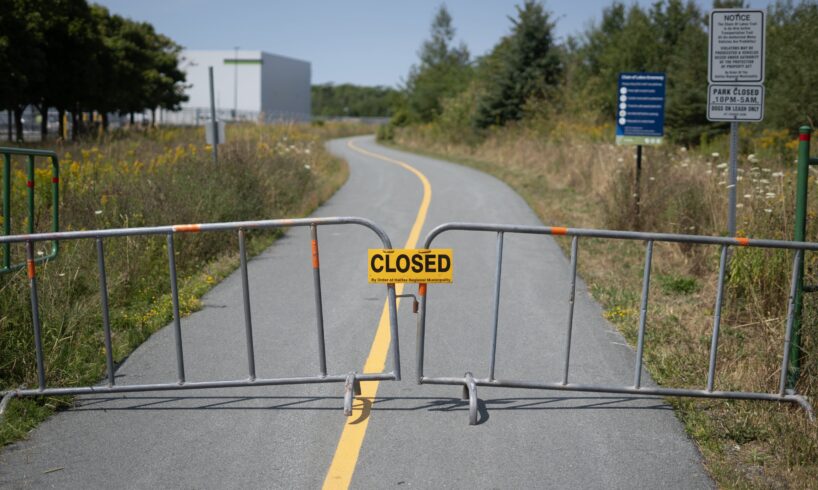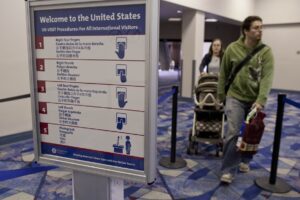
Open this photo in gallery:
A barrier is placed at the Chain of Lakes Trail in Halifax last week after the Nova Scotia government announced it was banning access to wooded areas because of elevated wildfire risk.Darren Calabrese/The Globe and Mail
Nova Scotia and New Brunswick are facing opposition and threats of legal action after ordering residents to stay out of wooded areas and threatening hefty fines in an effort to prevent wildfires.
Both provinces banned hiking, camping, fishing and vehicle use in wooded areas, with violators in Nova Scotia facing fines of up to $25,000.
The restrictions have prompted debate among residents and backcountry users, raised concerns about the impact on homeless people, and prompted an advocacy group to threaten a legal challenge. The governments say the restrictions are necessary to stop human activity that can start wildfires in the current stretch of hot and dry weather.
As of Tuesday, Nova Scotia has issued six fines, and New Brunswick Premier Susan Holt said Monday her province has handed out two fines for violating the woods ban. Burn bans are in place across both provinces, carrying fines of $25,000 in Nova Scotia and $140 in New Brunswick.
The Editorial Board: Provincial forest bans miss the point
The fines in Nova Scotia include one levied against Jeff Evely, who intentionally incurred a $28,872.50 fine as a form of protest. He posted a video about it on YouTube.
Mr. Evely, who frequently walks his husky on the forest trails near his Cape Breton home, said he intends to fight the ticket as a violation of his rights under the Charter of Rights and Freedoms.
“There is no logical connection between my sneakers and fire. There’s no fire hazard associated with simply walking in a wooded area,” Mr. Evely said. “I’m trying to stand on a matter of principle.”
Under Nova Scotia’s Forests Act, the Minister of Natural Resources can put travel restrictions in place in any forested area to protect the woods.
Two constitutional lawyers told The Globe and Mail the main question in a legal challenge of the restrictions would be whether the measures are proportionate to the risk of wildfires.
“The purpose here is pretty clear and fairly compelling – which is important for these kinds of Charter cases – in that it’s a very high fire risk,” said Wayne MacKay, a law professor at Halifax’s Dalhousie University.
“The real debate is: Is it going too far? Is the fine too high?”
The Canadian Constitution Foundation started a petition against Nova Scotia’s woods ban and sent a letter to Premier Tim Houston, saying the province’s decision “arbitrarily infringes” on Charter and Aboriginal treaty rights.
Nova Scotians lament early end to summer after wildfire risks force ban on most outdoor activities
People living, visiting and running businesses in Atlantic Canada are affected by the ban, said Joshua Dehaas, counsel to the foundation. He said his organization is particularly concerned about the restrictions in Nova Scotia because the fines are large and could apply to private property, including guests of residents with wooded areas in their own backyards.
“The big uncertainty is what really counts as woods, because there’s a legal definition,” Mr. Dehaas said. “Halifax has interpreted woods to mean that if there’s a municipal park and it’s got a lot of trees in it, it’s entirely closed. But if there are roads going through that park … that’s no longer forest.”
The Ecology Action Centre in Nova Scotia previously criticized the province as relying on “blunt tools,” and called the woods ban “heavy-handed.” However, the environmental group has since revised its position, calling on the government to devise “a meaningful, evidence-backed and clearly communicated plan to address the climate emergency.”
This is the seventh time Nova Scotia has restricted travel and activities in the woods, most recently in the spring of 2023. With no rain in the forecast, prevention is the best medicine for protecting communities from wildfires, said Scott Tingley, manager of forest protection with the Department of Natural Resources.
In 2023, Canada’s worst wildfire season on record, humans caused 95 per cent or more of wildfires across the Maritime provinces, according to a Canadian Interagency Forest Fire Centre report. Some human-caused wildfires are arson, but many are accidental, starting as a partially extinguished campfire, cigarette embers or a falling power line.
Parks Canada is following the provinces’ lead, closing national park backcountry and trails “in the interest of visitor and public safety,” spokesperson Martin Bauman said.
Opinion: The people opposing Nova Scotia’s ban on accessing the woods don’t understand our culture
Areas outside of the forest, such as front-country campgrounds and beaches, remain open at national parks.
“These measures will be in effect until conditions allow them to be lifted,” Mr. Bauman said.
It’s important for all levels of government to warn the public about the risks during extreme weather events, said Gordon McBean, a climate expert and professor at Western University. The provinces’ woods bans stop people from accidentally starting fires in densely forested regions and protect them from the toll wildfires and smoke have on their physical and mental well-being, he said.
“They’ve got areas of high-level risk based on their science-based analysis, based on the dryness, the temperature, the lack of precipitation of these areas across New Brunswick and Nova Scotia,” Prof. McBean said.
Other Atlantic provinces are taking precautions to prevent wildfires from spreading.
Prince Edward Island and Newfoundland and Labrador have banned all open fires on public and private property. Last week, Newfoundland Premier John Hogan announced fines for lighting illegal fires that could amount to $50,000 for first-time offenders, while an unpaid fine could result in up to six months’ imprisonment.





